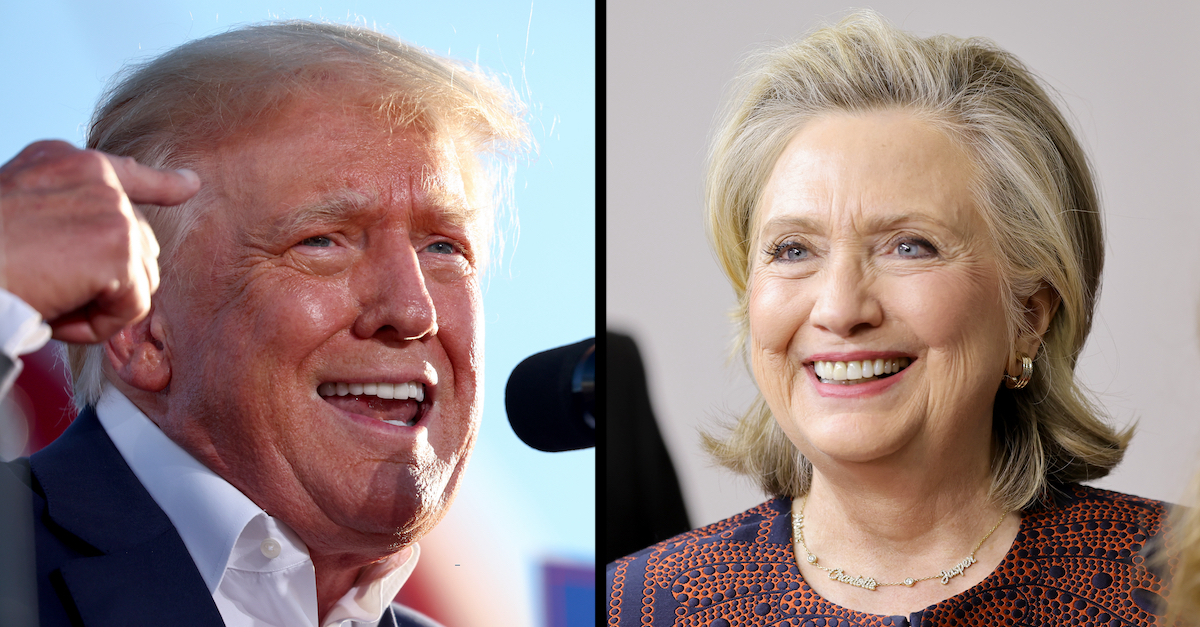
Former U.S. President Donald Trump spoke during a campaign rally at Legacy Sports USA on October 9, 2022 in Mesa, Arizona. Hillary Clinton attended an event on September 10, 2022 in Toronto, Ontario.
An attorney for former President Donald Trump on Tuesday filed the precursor to a long-promised appeal in a rubbished racketeering lawsuit against Hillary Clinton and a number of political foes from the 2016 election cycle.
However, the document wasn’t properly signed, the court clerk’s office indicated almost immediately.
A terse notice of appeal submitted to the U.S. District Court for the Southern District of Florida reads accordingly: “Notice is hereby given that the plaintiff, Donald J. Trump, appeals to the United States Court of Appeals for the Eleventh Circuit from the Order of the Hon. Donald M. Middlebrooks entered on Sept. 8, 2022 . . . in the instant action.”
Attached was a copy of a check and a receipt for $505 to cover the cost of transmitting the lower court record to the circuit court of appeals.
The district clerk of court’s office quickly spat back a deficiency notice. It says the relevant documents “were filed conventionally that should have been filed electronically” — they appear on the docket as scans of paper documents rather than as PDF text files — and as “missing required signature(s)” under Federal Rule of Civil Procedure 11(a).
The relevant rule reads:
Every pleading, written motion, and other paper must be signed by at least one attorney of record in the attorney’s name—or by a party personally if the party is unrepresented. The paper must state the signer’s address, e-mail address, and telephone number. Unless a rule or statute specifically states otherwise, a pleading need not be verified or accompanied by an affidavit. The court must strike an unsigned paper unless the omission is promptly corrected after being called to the attorney’s or party’s attention.
The notice of appeal was electronically signed by Jared J. Roberts of the Binnall Law Group in Alexandria, Virginia, as an attorney for Trump. His insertion into the matter appears to be new, as his name does not yet appear on the docket as having entered an official appearance for Trump. Attorneys Alina Habba and Michael T. Madaio, both of Bedminster, New Jersey, and attorneys Peter David Ticktin and Jamie Alan Sasson, both of Deerfield Beach, Florida, have long been Trump’s attorneys of record in the case.
Roberts has been licensed to practice law in Florida since May 18, 2022, according to the state bar’s website. He is a member of the bar’s “young lawyers” section, the website indicates. His professional profile — he works for Trump attorney Jesse R. Binnall’s law firm — says he graduated from law school in 2021 and is active in “local Republican organizations.”
Trump’s counsel of record filed the case in question on March 24 as an archlawsuit of grievances connected to the 2016 election. The defendants in the original 108-page civil lawsuit included, but were not limited to, the Democratic National Committee, its law firm Perkins Coie, that firm’s former partner Michael Sussmann, Rep. Debbie Wasserman Schultz (D-Fla. 23), Fusion GPS, Christopher Steele, former FBI Director James Comey, former FBI agent Peter Strzok, former FBI attorneys Lisa Page and Kevin Clinesmith, and former deputy FBI director Andrew McCabe. Also sued were several “John Does” and unknown corporations.
The case was widely criticized when it was filed and fared no better after judicial scrutiny at the district court level. Clinton and the other defendants quickly pointed out that Trump’s myriad allegations and causes of action were time-barred by the applicable statutes of limitation. Trump’s attorneys attempted unsuccessfully to argue that the statutes of limitations should be tolled during Trump’s entire presidency because he was too preoccupied with the demands of his job to file the case while he was still in the White House.
Clinton impresario John Podesta, who was also a named defendant, even used Trump’s tweets against him in his requests to jettison the case.
Even if the claims weren’t time-barred, the defendants asserted that Trump was wrong on the law.
The government successfully substituted itself as a defendant for many of the original named parties, and Judge Middlebrooks dismissed the entire proceeding in spectacular fashion on Sept. 9.
One of the named defendants has since moved for sanctions; Trump’s attorneys defended their case by saying key portions of it were lifted from an indictment filed by Special Counsel John Durham against Igor Danchenko. Danchenko was not named as a defendant in Trump’s RICO case, and his criminal case — he allegedly lied to the FBI — currently remains unresolved.
The papers filed Tuesday promise an appeal, but as of the time of this report, no concomitant paperwork has been filed before the 11th Circuit Court of Appeals, the requisite appellate bench that would hear the case.
[Photos as follows: Trump by Mario Tama/Getty Images; Clinton by Amy Sussman/Getty Images.]